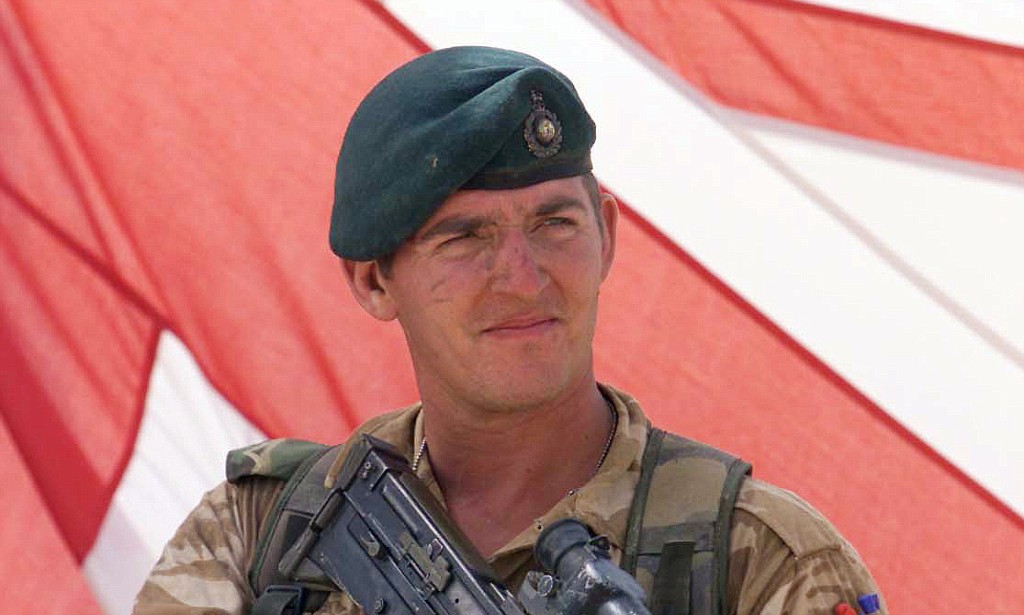Conviction of ‘Marine A’ reduced to manslaughter

Sergeant Blackman found guilty of murdering an injured Afghan fighter
A historic murder conviction against British marine Alexander Blackman, who shot dead a seriously injured Taliban prisoner in Afghanistan, has been quashed by the Court Martial Appeal Court in London and replaced with one of manslaughter on the grounds of diminished responsibility.
Blackman, the first member of the UK armed forces in recent years to be convicted of murder while on an overseas tour, was known as Marine A during the original trial and was only identified when convicted. He has been serving a life sentence in a civilian prison since 2013, but will now be resentenced at a separate hearing within the coming weeks.
During the hearing, Mr Blackman’s defence team argued that fresh psychiatric evidence showing that Blackman was suffering from a recognised mental illness at the time, would have provided him with the ‘partial defence of diminished responsibility’ had it been available to the court at the time of his conviction.
The panel, including some of the country’s most senior judges including Lord Thomas of Cwmgiedd, the lord chief justice, and Sir Brian Leveson, president of the Queen’s bench division, were urged to overturn the ‘unsafe’ murder conviction against Mr Blackman on these grounds.
In their ruling, the judges stated that Mr Blackman had been ‘an exemplary solider before his deployment to Afghanistan in March 2011;’ but that ‘The appellant suffered from quite exceptional stressors … during the time of that deployment which increasingly impacted on him…’
‘Given his prior exemplary conduct, we have concluded that it was the combination of the stressors, the other matters to which we have referred and his adjustment disorder that substantially impaired his ability to form a rational judgment.’
According to a report in the Times today, two key witnesses – Colonel Oliver Lee and Sergeant-Major Stephen Moran – claimed in written evidence that they had been blocked from telling Blackman’s first court martial about failures by his commanding officers. It was reported that ‘a breakdown in command’ in the weeks before the shooting led to the unit spiralling ‘out of control’. Colonel Lee, who resigned his commission over the case, claimed to have been ‘actively prevented [from testifying] by attempts to silence me from within the Royal Marines’.
Emerging on to the steps of the court yesterday to applause from a crowd of veterans, Blackman’s wife Claire expressed her delight at the result, stating that it ‘much better reflected the circumstances that [her] husband found himself in during that terrible tour of Afghanistan’. She went on to add that ‘We must now hope to secure a significant reduction in the sentence.’
Reacting to the case, a spokesperson for the Ministry of Defence said: ‘We have fully cooperated with each stage of Sgt Blackman’s case … and will continue to provide personal support to the family, as we have done since charges were first brought. We respect the court’s decision and it would be inappropriate for us to comment further on it.’
At his original trial in 2013, Blackman pleaded not guilty to murder at a Court Martial at the Military Court Centre, Bulford, Wiltshire after graphic evidence from a helmet mounted camera caught the marine shooting a badly-wounded Taliban prisoner in the chest at point blank and then declaring: ‘I have just broken the Geneva Convention.’ He was convicted contrary to section 42 of the Armed Forces Act 2006 and sentenced to life imprisonment with a minimum custodial term of ten years. He was also reduced to the ranks and dismissed with disgrace from Her Majesty’s Service.
Following his conviction, the Daily Mail launched a ‘campaign for justice’ for Blackman, which resulted in readers donating around £800,000 to a legal fund. In May 2014, an appeal against conviction was launched and, in December 2015, Mr Blackman applied to the Criminal Cases Review Commission (CCRC) for a review. The case was referred by the Commission to the Court Martial Appeal Court after an 11-month review.
As previously reported in the Justice Gap, questions have been raised in the past about the waiting times faced by those seeking review of criminal convictions. While a 2015 inquiry by the House of Commons justice committee into the organisation in 2015 concluded that waiting times had become ‘unacceptable’, the fast tracking of this case, and others including the high-profile Ched Evans case, leads to suggestions that the watchdog continues to give special treatment to those cases which garner a huge media interest.
‘We don’t approach things in that way,’ the CCRC’s chief executive Richard Foster told the Justice Gap in 2016. He pointed out that the CCRC has a policy on the prioritisation of cases – for example, ‘if someone is very ill and they might die; if there is evidence that might be unattainable if we wait too long; if there is a risk because of the high interest in the case that evidence might become contaminated’.






